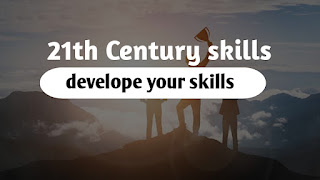THE ELIGIBILITY CRITERIA FOR SUCCESS IN THE EXAM OF 21TH CENTURY
It is not the strongest of the species that survives, nor the most intelligent, but the one with the most response to change."
~ Charles Darwin
We live in an age of information technology and disruptive innovation, where it is essential to understand the current parameters of this century and age shift, the current situation of the world, and the criteria for success in the current unpredictable situation. Here is the quotation of the legendary Peter Drucker, who says, "Since we live in an age of innovation, a practical education must prepare a person for work that doesn’t yet exist and cannot yet be clearly defined," so learn the new skills and watch the current trends and work ethics of the world of professionalism.
• What are the eligibility criteria for success in the age of innovation?
• What are the key skill sets that comprise the curriculum of the 21st century?
• What should we do to achieve our goals and dreams?
These are some of the key questions we will discuss in this blog.
The ability to quickly acquire new skill sets, tool sets, and mind sets and apply new knowledge and the knowledge of how to apply essential skills of the 21st century, the ability to learn, unlearn, and relearn in the age of information
These are the skills and capacities we have to learn and develop for the nourishment of our personalities and professional lives. It is the criteria of this age that we have to prove ourselves and fulfill the demands of the current age.
Obviously, we live in an age of innovation; we should be innovative, creative, competitive, and collaborative to achieve huge success, and now the question arises: what are the skills of the 21st century? What is the key curriculum for a fulfilled and satisfied life? So here are the skills that experts categorize by the different parameters.
1. LEARNING AND INNOVATION SKILLS:
• Critical thinking and problem solving
• Communication skills and collaboration
• Creativity and innovation
2. Digital literacy skills:
• Information literacy
• Media literacy
• Understanding of information and communication technologies
3. CAREER AND LIFE SKILLS:
• Flexibility and Adaptability
• Productivity and accountability
• Leadership and Responsibility
• Initiative and self-direction
• Social and cross-cultural interaction
What were the conditions that made your high-performance learning experience so powerful?
Well, they were the
1. Very high levels of learning challenges, often coming from an internal personal passion
2. Equally high levels of external caring and personal support—demanding but loving teachers, mentors, a tough but caring couch, or an inspirational learning guide
3. Full permission to fail safely, with encouragement to apply the hard lessons learned from failure to continuing to struggle with the challenge at hand.
This is also important to understand.
a.The world of work is increasingly made up of teams working together to solve complex problems, resolve conflicts, and create something new, which is why most people work alone and compete with others for their personal promotion and approval.
b. Technology is more a part of our people’s lives who work with corporations, companies, and agencies, as well as the IT sector.
c. The world is full of engaging, real-world challenges, problems, and questions; why spend so much time on disconnected questions at the end?
d. Innovation and creativity are the most important skills for future success and our economy; why do schools, universities, institutions, foundations, and academies spend so little time on developing creativity and innovative skills?
For the essentialism of such 21st century skills, President Barack Obama stated: :I’m calling on our nation’s governors and state education
Chiefs to develop standards and assessments that don’t simply
Measure whether students can fill in a bubble on a test, but
Whether they possess 21st-century skills like problem-solving
And critical thinking, entrepreneurship, and creativity.
"President Barack Obama"
• The illiterate of the 21st Century are not those who cannot
read or write, but those that cannot learn, unlearn, and
relearn.
"Alvin Toffler "
• The crux of success or failure is knowing which core values
To hold on to, and which to discard and replace when times Change.
"Jared Diamond"
Harvard Business School stressed the importance of organizational capabilities, technological innovation, and continuous learning. One skill that people will need to acquire in the future is not spot knowledge or knowing things per se, but knowing how things relate to one another. Last but not least, we are going to share the most important skills that no one institution teaches and are essential for the development of personal and professional lives.
Here are the skills you should learn, develop, and research.
* How to learn, unlearn, and relearn
* How do you think creative?
How to generate new knowledge and new approaches to innovation?
How do you manage your time and resources?
* How to find alternative and possible solutions to complex problems
* How do you deal with mental and psychological issues?
* How to deal with uncertainties and real-life difficulties
* How do you deal with unpredictability and situations?
How to manage emotions
* What is the best way to argue and analyze information?
How to negotiate
* How to state business
* How do I research?



0 Comments